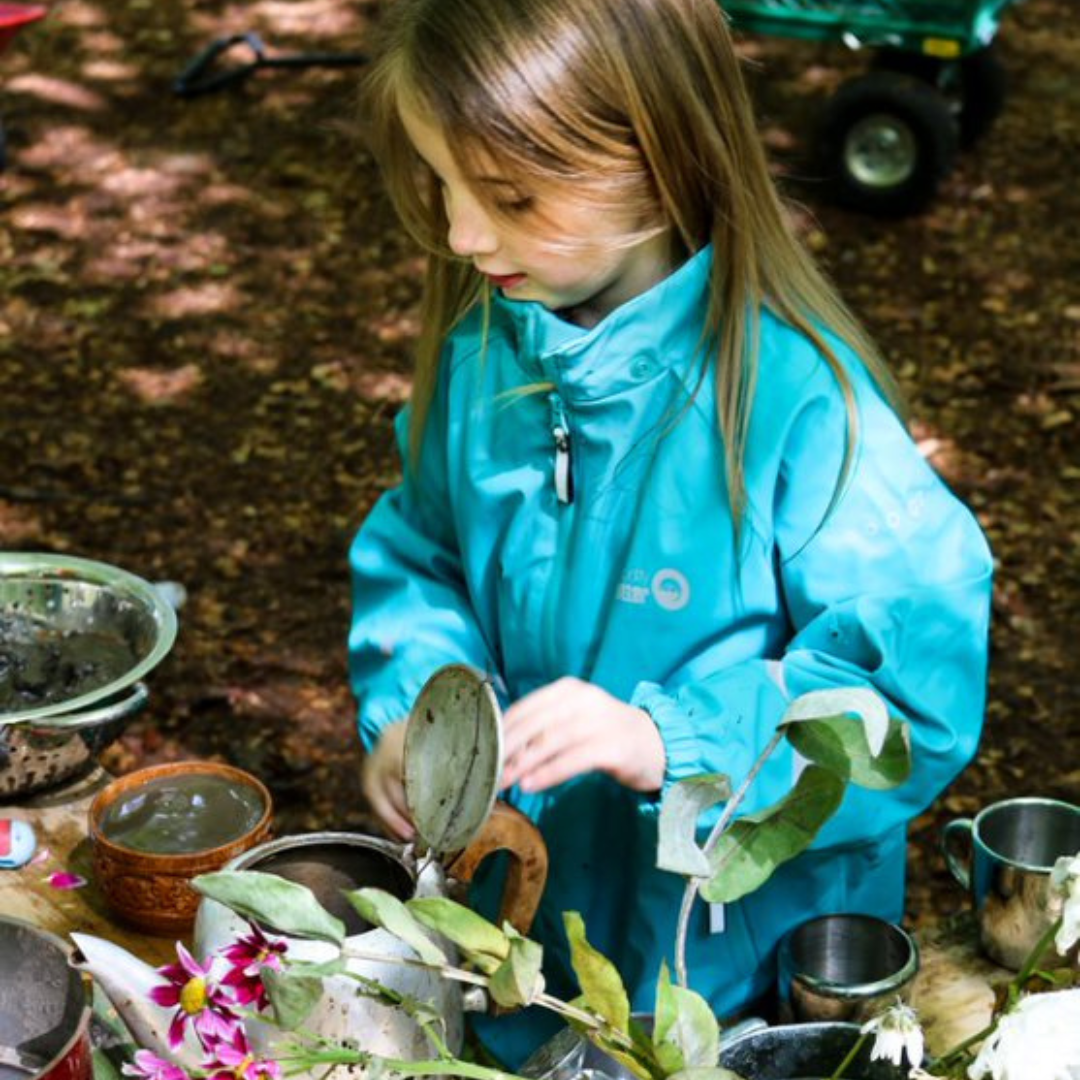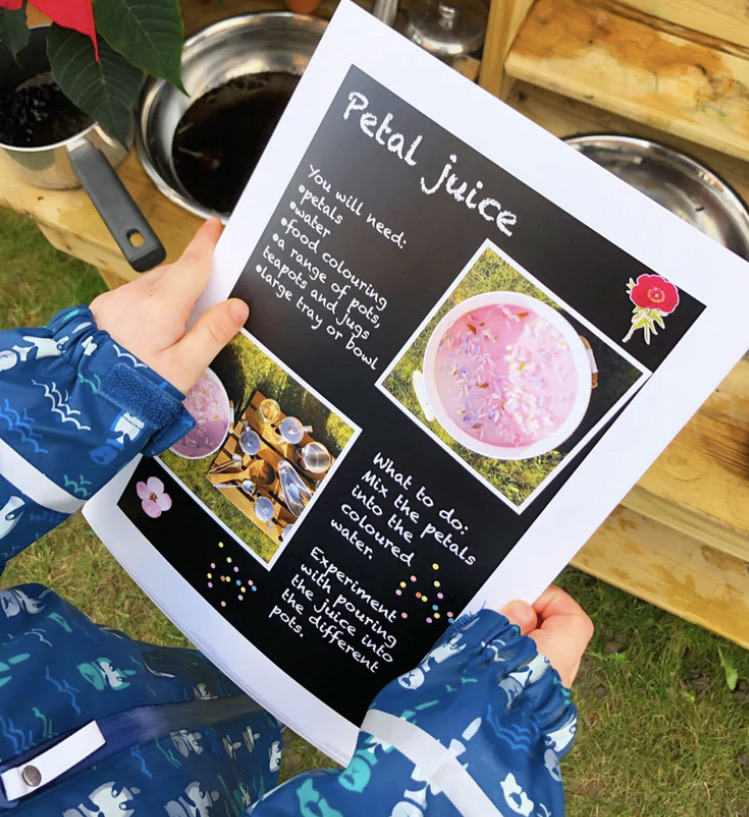Mud Kitchen Play
Posted by Spotty Otter on 28th Jun 2022
What Is a Mud Kitchen? What are the benefits of playing with Mud?
Everyone knows how much children love to play in the mud. After all, who hasn’t made a mud pie in their life? A mud kitchen is an outdoor play station that allows children to engage in pretend and messy play by cooking with mud, sand, and water. Mud kitchens help children to develop fine motor skills, roleplay, exploration, and social skills. Mud kitchens are beneficial for children ages 1-7.

What Is a Mud Kitchen?
A mud kitchen is an outdoor structure used for play. This mud kitchen is a space where children can utilize kitchen tools to pretend to cook with any variation of mud, sand, and water. These mud kitchens usually involve a surface to work, a sink or bin area, as well as shelves, bowls, mud, and other tools.
What should be in a Mud Kitchen?
Mud kitchens vary depending on the individual station and preference. However, mud kitchens usually have the following items:
Pots and Pans: children see their parents cooking with pots and pans all the time and will mimic their cooking methods. Pots and pans provide a container for children to pretend to cook with, and they allow children to exercise what they have seen themselves.
Utensils: Utensils are necessary for any kitchen, and a mud kitchen is no different. Utensils can help children practice fine motor skills by allowing them to mix and create pretend food.
Old Jars: Jars provide another container for children to utilize and to store things, such as acorns and homemade potion concoctions.
Tins and other containers: Muffin, pie, and pudding tins are beneficial for children and should be used as items in a mud kitchen.
Mixing Bowl: Children use mixing bowls to mix up their food items and practice mimicking what they have seen.
Watering Can: Watering cans help children to add water into their mixtures and to provide a level of control. Pouring practice is also valuable.
Mini Chalk Board: Mini chalkboards are useful for children to practice their writing and drawing skills while in the kitchen. These chalkboards can be a kitchen menu, an ingredient list, or even a drawing area.
Measuring Jugs: Measuring jugs helps children practice their measuring skills. Measuring and pouring helps to enhance and develop fine motor skills.
Spotty Otter Waterproofs : Of course we are recommending our own Spotty Otter Waterproofs! Although it is good for children to engage in messy play, waterproofs should be available in the mud kitchen. If they are available and the children choose to wear them, then they can help them learn the value of self-care and staying clean. We recommend our Forest Collection because your otter cubs need quality, robust clothing that keeps them protected, but doesn’t constrict playing, exploring, climbing and splashing. Mud, water, wind and sand, our double-the-fun, Forest kids' waterproof clothing, takes everything they can throw at it and asks for more!

What Are the Benefits of a Mud Kitchen
Mud kitchens are very beneficial for children. They provide opportunities to grow in almost every aspect. Here are a few of the benefits:
Fine motor skills: When working in a mud kitchen, children practice using utensils, measuring and pouring mud, and mixing up items. These techniques help children to develop and practice their fine motor skills.
Health benefits: When children get the chance to explore on their own with the freedom to express themselves, their mental health is likely to be higher. Playing in the mud also helps with physical health. Playing in the dirt helps to strengthen and build up the immune system. The more that children are exposed to the bacteria in the dirt, the stronger their immune systems will become.
Maths skills: A mud kitchen provides lots of opportunities for measuring, weighing, filling, and emptying. All of these contain mathematic skills which are beneficial in helping children develop and learn.
Roleplay and imaginative play: Mud kitchens allow children creative freedom to play. Imaginative play helps children to develop language skills, practice what they have learned and observed, and helps them make real-world connections.
Sensory development: Sensory play is important for children, especially at younger ages. Many early years settings have sensory area's that provide different textured items that children can engage with. A mud kitchen is like a sensory table, and it offers lots of nature items with sensory benefits for children.
Mud Kitchen Resources
Our friend Katie Taylor is an EYFS Teacher & Forest School Leader. She is the Author of The Nature Adventure Book and founder of Early Years Outdoor. She has some wonderful Mud kitchen recourses which you can downloads or purchase at an affordable price.
There are two sets of ten mud kitchen recipe cards printed on white satin card, in high quality ink. Created digitally on a blackboard style background using images of the recipes all tried out by my own class and children.
You do not need a mud kitchen to use these recipes and can use the ideas in outdoor play. They're perfect for getting print into the outdoors and encourage children to be more creative and develop some of their early reading skills.
The recipes include: nature smoothies, nature salad, nature cookies, muddy burger, herby mud cakes, muddy coffee, nature kebabs and herby tea. There is one recipe per page of the document and all ideas and photography are by me. They have a black background and white/yellow writing. Use them in mud kitchens, tuff trays or make into a booklet to provide inspiration when playing outdoors.

Find them here.
